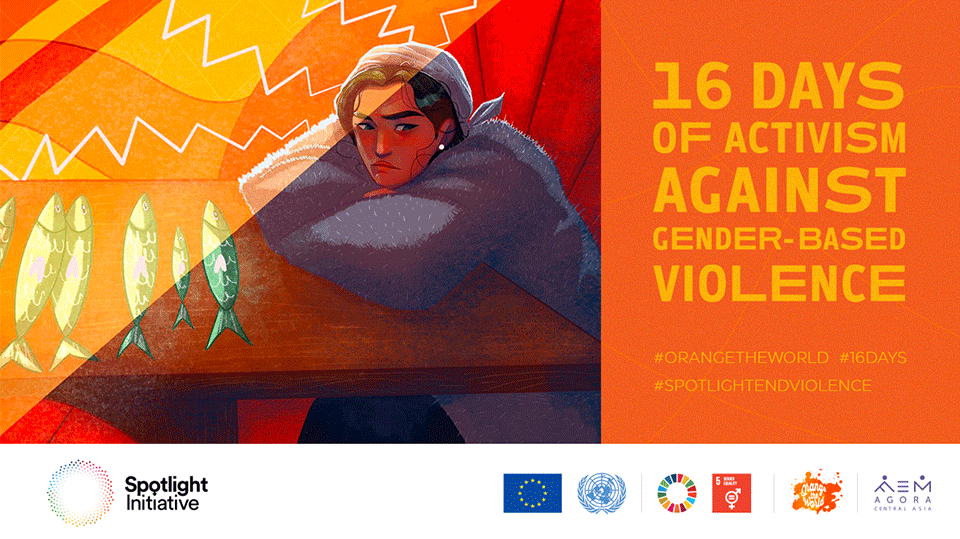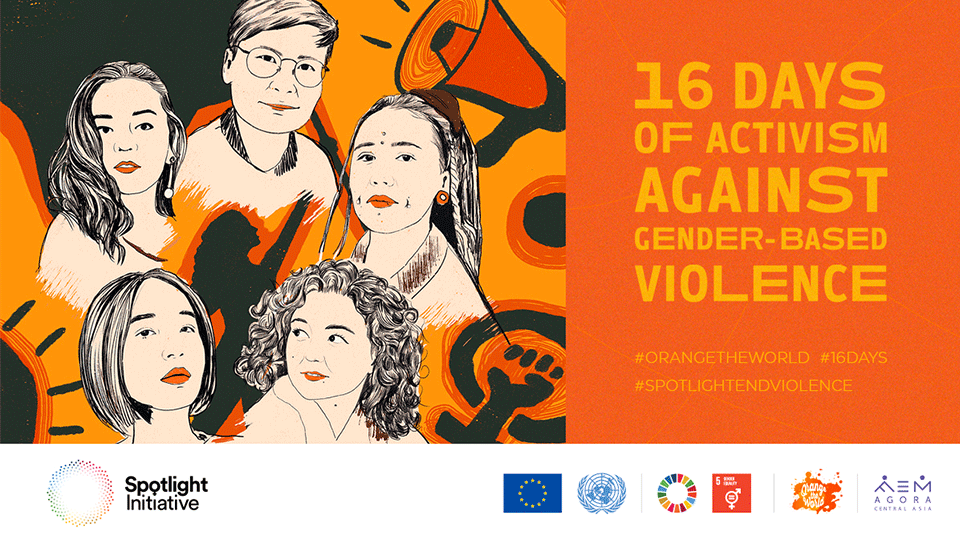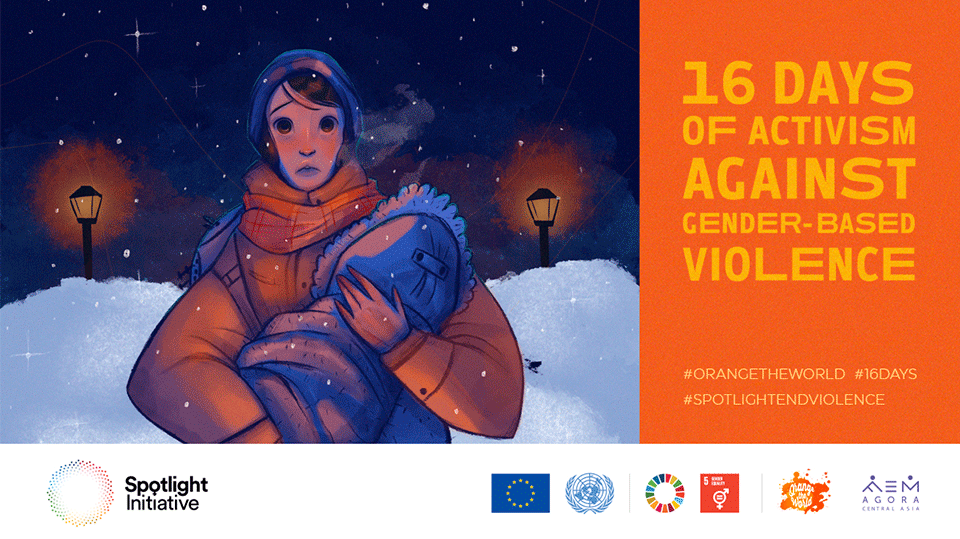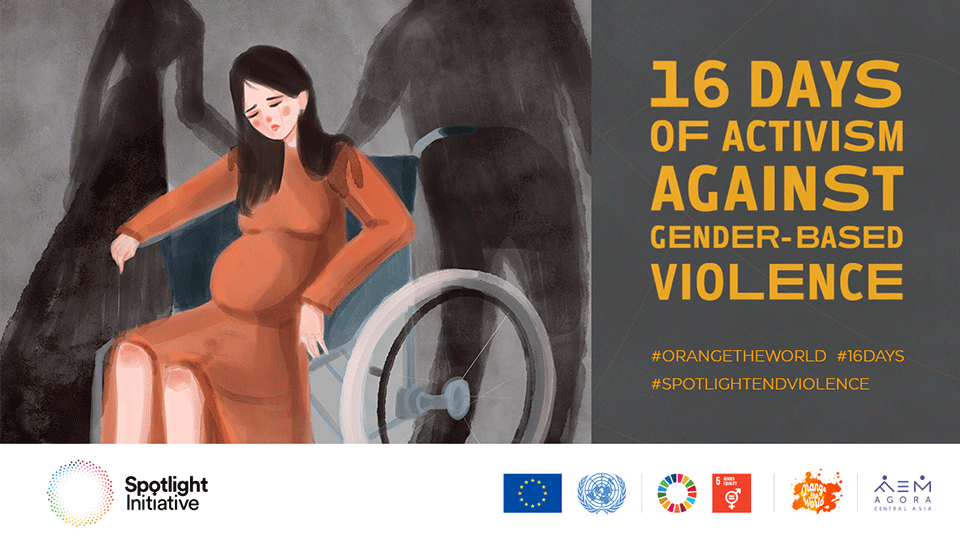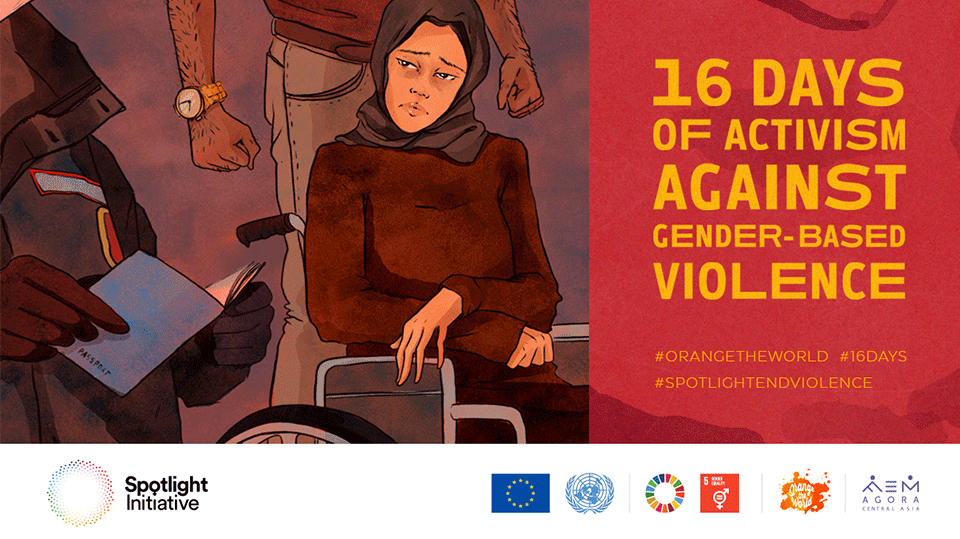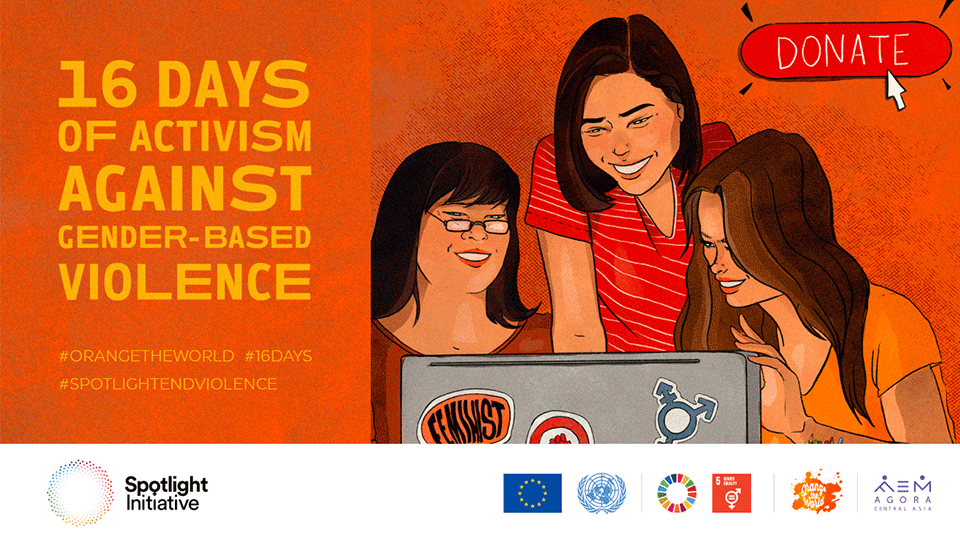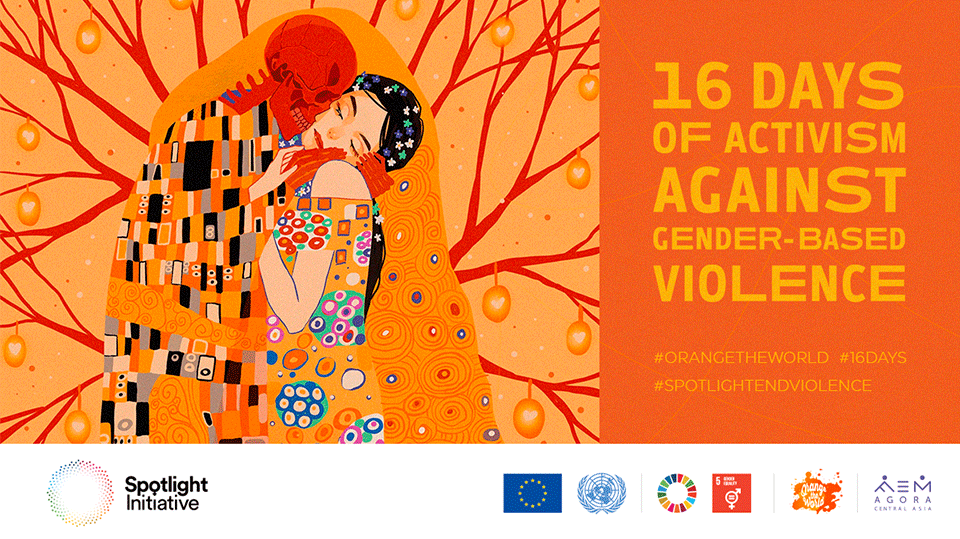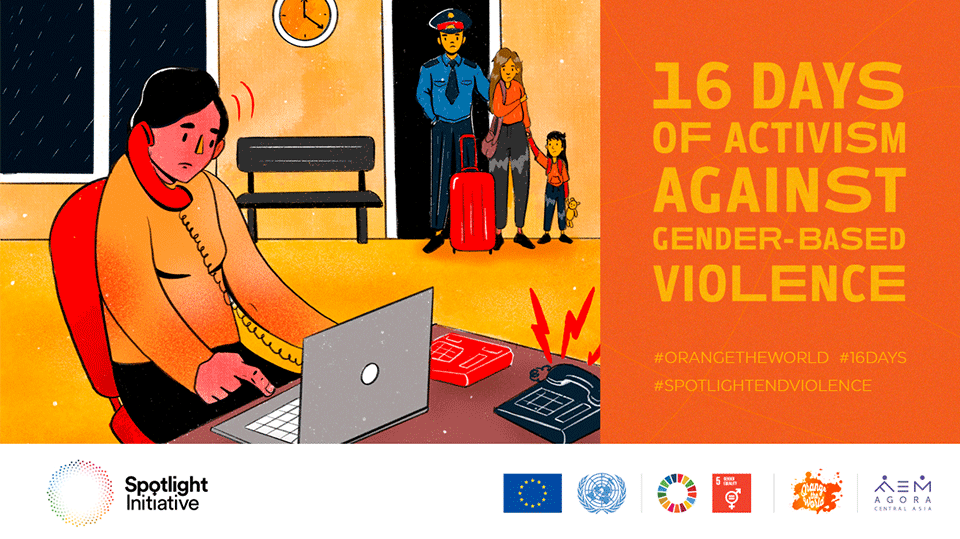Uniting against gender-based violence in Central Asia
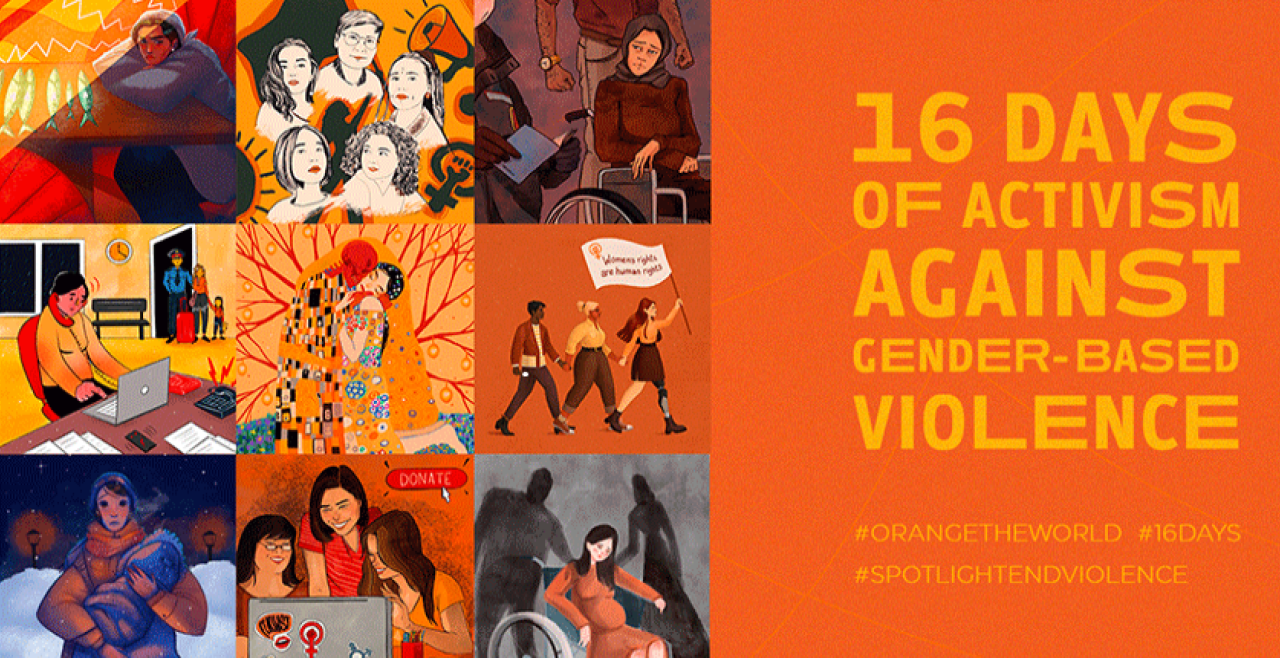
The Spotlight Initiative Regional Programme in Central Asia, in collaboration with FemAgora, a feminist non-government organization in Central Asia, joined forces for 16 Days of Activism Against Gender-Based Violence under the global theme, Orange the World: Fund, Respond, Prevent, Collect!.
Over the course of 16 days, the campaign highlighted the importance of crisis centres, their daily work, shelters, hotlines, and direct anti-violence services as the backbone of civil society activism to end gender-based violence. Facing many challenges and barriers, they continue to promote and empower girls, women and transgender people, often in the most difficult and vulnerable situations. Taking responsibility from the first contact with survivors of violence, they also document cases and collect valuable evidence on systemic human rights violations. But they often lack adequate funding, while inclusive and anti-discrimination policies and regulations would aid their work.
Here’s an overview of stories along with illustrations highlighting experiences of survivors, the daily work of the expert community of crisis centres, the feminist movement and the civil society in Central Asia. The campaign also underlined important international days including 29 November, International Women Human Rights Defenders Day; 1 December, World AIDS Day; and 3 December, International Day of Persons with Disabilities, among others.
The Spotlight Initiative Regional Programme is led by the United Nations and funded by the European Union.
Our planet is held by the hands of working women
All of us know the concept of "women's invisible work", or unpaid domestic work. But there is another type of work – migrant women who are often informally employed without documents, fair wages, access to social security, paid leave and health insurance.
Some of the most difficult tasks are done by these women, making our everyday lives easier. We can see them behind cash registers and counters, they clean streets and wash floors in offices and collect orders in online stores. Such work often makes them vulnerable when it comes to the rule of law and fair wages are not guaranteed. During crises, such working conditions can be very harmful to a person’s health, and sudden dismissal without adequate compensation can happen any day. According to the International Labour Organization (ILO), more than 60 per cent of world’s employed people earn a living in the informal economy, and 740 million of them are women[1]. Meanwhile, in developing countries the percentage of women workers who are informally employed (92 per cent) is substantially higher than the percentage of men workers (87 per cent)[2].
All informal workers can face violence due to their employment status and lack of protection, but informal female workers are more vulnerable to gender-based violence in unsafe working conditions. Violence can take different forms, including physical, verbal, economic, sexual and psychological violence.
This issue is especially important for women from Central Asia, as they constitute the majority of migrant workers in the region. During the pandemic, when movements were limited; workers in crisis centres across Central Asia provided humanitarian, psychological and legal assistance to women migrant workers in need of support. Some of them were forced to even live at the border.
It is very important that every woman in any work situation is officially employed so that her rights are protected, her workplace is free from discrimination and harassment and does not pose any threat to her health.
International Women Human Rights Defenders Day
29 November is recognized as the International Women Human Rights Defenders Day. Since 2006, the day celebrates the work and pays tribute to women from all over the world who have long been at the forefront of the collective struggle for the protection and advancement of women’s human rights as well as all those who work for substantive equality in every sphere of society.
Activism and the defense of human rights always go hand-in-hand, but this work can also be invisible. That is why it is important to acknowledge those women who support people who are unable to defend their rights independently and who are speaking up for those whose voices remain unheard. The work of women human rights defenders all around the world is associated with risks and hazards such as false accusations, legal proceedings, surveillance, kidnapping, torture and even death threats. Women human rights defenders face gender-based violence as well, including in the Central Asia region. This could involve threats to their families and children, domestic violence, sexual harassment or violence, convictions for moral violations, attacks against their professional reputations because of gender, devaluation of their words and experiences by men, and personality judgments based on physical appearance. Defense of human rights may run counter to certain outdated traditional practices, as well as break the stereotype of women as silent house and family keepers.
All of these factors make women human rights defenders very vulnerable, and further underline the need for their respective protection and support, taking into account all aspects of gender-based violence. It is important to recognize their actions at the societal level and in political life.
HIV-positive women and gender-based violence
We want to tell you about the woman depicted in the illustration. When the pandemic started and everyone moved to voluntary self-isolation at home, she could no longer stay with her husband, because he was beating her. She took her son to keep him safe and decided to hide in the shelter of a crisis centre. But she was refused entry. It was -40 degrees outside and she had to spend the night at the bus station to keep her and her child warm. At the crisis centre they told her that they are prohibited from providing services to HIV-positive people by law, and even showed her an official document. Employees of the crisis centre and activists tried to support the woman, but the immediate and necessary support was not provided.
During the pandemic, when there is a rise in the number of domestic violence cases, every woman should have an opportunity to receive support from crisis centres. But very often support is hampered by the lack of HIV awareness, high levels of stigmatization, insufficient number of crisis centres and emergency care for women and discriminatory legislation. It increases the female mortality rate and their vulnerability to COVID-19. It is important to speak publicly about the problems faced by HIV-positive women in Central Asia and beyond. Every woman should have the right to health care, as well as social, legal and psychological assistance.
International Day of Persons with Disabilities
3 December is International Day of Persons with Disabilities. In Kyrgyzstan, there are two organizations of people with disabilities - Equality and Nazik Kyz. Two years ago, they faced the need to open a shelter when a pregnant girl was seeking their help. Her father and older sisters were forcing her to get an informal abortion. She had to hide and find a safe place, but there was nowhere. Moreover, she required a place where special needs are taken into account. This girl was saved from great difficulties, and her situation proved the need of a shelter for those who do not feel safe at home.
More than 600,000 people in Kazakhstan are legally recognized as living with disabilities, and 44 per cent of them are women. During the pandemic and self-isolation, many of them faced new challenges - how to get up-to-date information about COVID-19 in the country, where to seek medical help in case of illness, and who to go to if violence occurred. Not everyone has access to the Internet and the ability to read and hear, as well as move independently to get to the hospital or the police if necessary.
Access to information, social isolation and gender-based violence are important issues faced by women with disabilities in Central Asia and globally. Therefore, it is important to acknowledge and address, not only the visibility and specific needs of people with disabilities, but also the different types of violence that they may face and how it can be prevented.
International Day for the Abolition of Slavery
Slavery has a woman's face. According to ILO and United Nations data, about 40 million people in the world are subject to different forms of slavery, and 71 per cent of them are girls and women. The fight for the eradication of slavery is not only the fight against human trafficking, but also the fight against discriminatory practices faced by most women and children. These include sexual exploitation, child labor, forced marriages, selling of women for the purpose of marriage, widow inheritance and forced recruitment of children into armed forces.
The illustration for this day depicts the real story of a woman with a disability. She was in love and hoped that her beloved took her to his country to live there together happily ever after. Her relationship with her parents and family was not strong, so she was glad that someone was going to take care of her. Upon arrival, the border guards checked their documents, and eventually they did not let them cross and interviewed them instead. The conversation continued at the police station and lasted for 24 hours. It turned out that the person she considered as her partner was involved in human trafficking.
The girl had no one in Bishkek, where she found herself after the interviews at the border and at the police station, so women human rights defenders managed to find a shelter for her and provided her with the most important psychological support in this situation.
This happens to many women across Central Asia and often they do not know where to call for help. Speaking up about this problem and discussing it in the regional context is important for preventing many more women from disappearing into the trafficking network. So is acknowledging the women human rights defenders and female workers of crisis centres who rescue women from such situations.
International Day of Volunteers for Economic and Social Development
This illustration is based on the story of a trans-activist from Kyrgyzstan and the self-organized volunteer activities in his community. In addition to working on a project to monitor violence against transgender people, he is involved in emergency response when trans-women need help in situations of violence. Trans women often face not only transphobia but also other forms of stigma and discrimination, as they may have HIV-positive status, be migrants, have a disability or use drugs. All of this can lead to denial of access to crisis centres.
During the pandemic, many lost their homes, especially those without residence and citizenship. One woman, who had the opportunity to rent an apartment, made a shelter out of it, inviting for a week those who literally had nowhere to live when the crisis centres could not provide the necessary support. Bishkek trans-activists, their friends and colleagues from other countries organized a crowdfunding campaign to raise funds to help trans women in situations of violence, unemployment and limited mobility. This created a temporary shelter for the community.
5 December is the International Day of Volunteers for Economic and Social Development. On this day, everyone is encouraged to support volunteer movements and projects in their community and in little-known communities that face multiple discrimination and limited access to resources.
International Day for the Remembrance of All Victims of Femicide
6 December is a day of remembrance for the 14 young women who were murdered in Montreal, Canada, in 1989. It has since been designated by the Parliament of Canada as the National Day of Remembrance and Action on Violence against Women.
Femicide or gender-related killings of women are widespread in Central Asia as well as globally. Femicide takes many forms and can happen in a variety of situations. It is femicide when the killer and victim are acquainted. Femicides also include killings of women who have a high degree of vulnerability, such as a disability or old age, were abducted, or in a difficult situation, such as being a migrant, homeless person, or a victim of violence. It can happen in situations of human trafficking or sexual exploitation; if the victim was from the LGBTQI community; was an activist, feminist, human rights activist; or as a result of a violent medical procedure, such as female circumcision or sterilization. If the murder is committed out of hatred for women, jealousy and machismo, ideas of "honour" and dignity or harmful cultural rules, because of the rejection of any type of relationship, marriage and general disobedience to men – these would also count as femicide.
It is difficult to determine exactly how many women die each year from femicide in the region, as there is only available data about survivors of domestic violence and those who sought help.
Crisis centres and shelters as safe spaces for women
During the pandemic, the number of domestic violence reports in Kyrgyzstan increased by 65 per cent. Women who experience violence need the help of crisis centres and shelters.
If a report of domestic violence is approved by the police, then the woman can stay in a shelter, as it is the only safe place for her. Women staff of the shelters and crisis centres in Central Asia work around the clock, without weekends and holidays, to provide the essential support needed for women survivors of violence and their children.
By Arina Osinovskaya, Selbi Jumayeva, Irra Bobkova, Fariza Ospan and Leyla Zuleikha Makhmudova. Originally published on the UN Women regional website for Europe and Central Asia.

